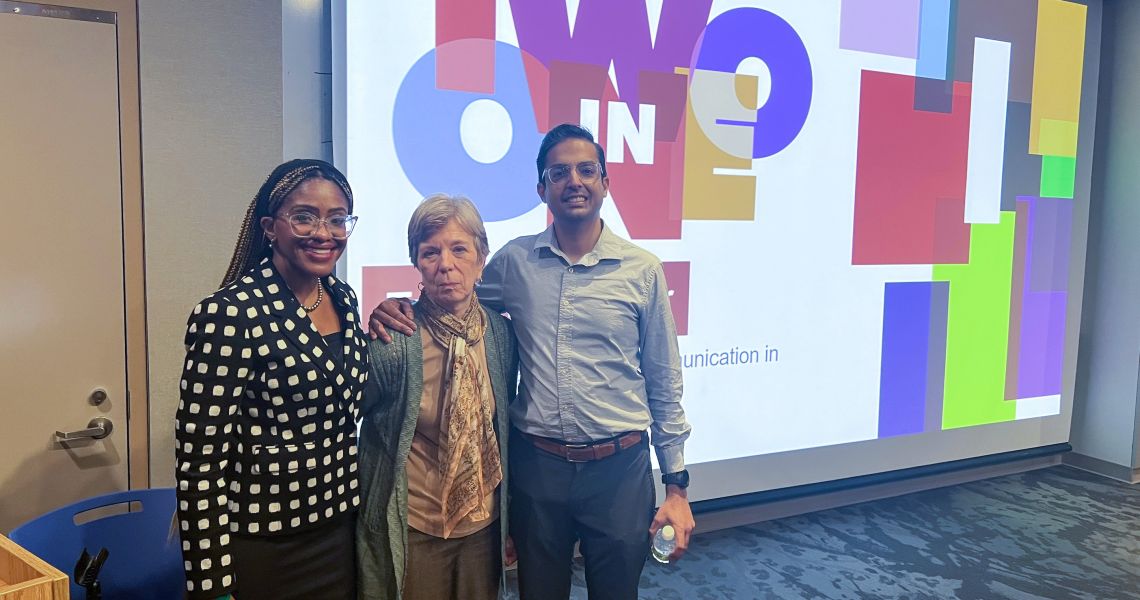|
January
Confronting U.S. History: We must end RACISM to end health disparities
with Nikole Hannah-Jones.
Navigate to Module 1 of Course Series
|
Objectives:
- Relate the history of U.S. slavery to poor health outcomes among Black subpopulations; and
- Recognize the enduring impact of racism as an ongoing threat to health equity.
|
|
February
Culturally Responsive Communication in Clinical Care
with Susan LeLacheur, DrPH and Lalit Narayan, MD.
Navigate to Module 2 of Course Series
|
Objectives:
- Define culturally responsive communication;
- Discuss the principles of culturally responsive communication; and
- Explain strategies for integrating culturally responsive communication into patient care.
|
|
March
How Clinicians Shape Community Narratives on HIV and COVID
with Oni Blackstock, MD
Navigate to Module 3 of Course Series
|
Objectives:
- Discuss the challenges of HIV and COVID stigma;
- Justify why clinicians have a role and responsibility in shaping community narratives on HIV and COVID; and
- Review examples of community-based roles clinicians can pursue to combat HIV and COVID stigma in patient communities.
|
|
April
Restoring Patient Trust through a Health Justice Approach
with Phillip M. Alberti, Ph.D.
Navigate to Module 4 of Course Series
|
Objectives:
- Describe the AAMC health justice framework;
- Explain why a health justice approach is most effective for achieving health equity for communities and health care equity for patients;
- Review how to translate principles of trustworthiness into clinical interactions and organizational behavior
|
|
May
We Test Everyone, Unless You Say No: State Level HIV Opt Out Testing and Screening Guidelines
With Clover Barnes of DC Health
Navigate to Module 5 of Course Series
|
Objectives:
- Describe the District of Columbia's opt-out HIV testing and screening guidelines;
- Explain the District of Columbia's routine HIV screening in ED settings; and
- Defend how patients have the right to informed refusal just as much as informed consent.
|
|
September
Culturally Responsive Communication, Part II: Sharing Power with Patients
With Adedotun Ogunbajo, PhD (Harvard Center for Population and Development Studies) and Elder George Kerr III (DC Center for AIDS Research)
Navigate to Module 6 of Course Series
|
Objectives:
- Describe culturally responsive communication;
- Identify the necessary values to facilitate culturally responsive communication;
- Practice what sharing power in the clinician-patient interaction looks like.
|
|
October
Primary care IS prevention: Why PrEP Belongs in the Primary Care Setting
With Executive Director, Stephen Lee MD, MBA, DHSM and Senior Program Advisor, Edwin Corbin-Gutierrez, MA of the National Alliance of State and Territorial AIDS Directors'
Navigate to Module 7 of Course Series
|
Objectives:
- Describe why the primary care setting is the ideal site for prevention in the healthcare system;
- Explain the role of PrEP in HIV prevention;
- Review the CDC PrEP screening guidelines.
|
|
November 1st
Combating PCP Burnout with Emergent Infections
With Leon McCrea II, MD, MPH, Senior Associate Dean of Diversity, Equity and Inclusion at Drexel University
Navigate to Module 8 of Course Series
|
Objectives:
- Name emergent infections in which PCPs have had to become familiar;
- Recognize signs of PCP burnout;
- List strategies to combat PCP burnout with addressing a range of emergent infections.
|
|
November 29th
Culturally Responsive Communication, Part III: Language and Literacy Access
With Director of Community Organizing at Latino Commission on AIDS, Joaquín Carcaño
Navigate to Module 9 of Course Series
|
Objectives:
- Describe culturally responsive communication;
- Recognize the types of information clinicians need to facilitate culturally responsive communication;
- Distinguish between language and literacy access in clinical settings.
|
